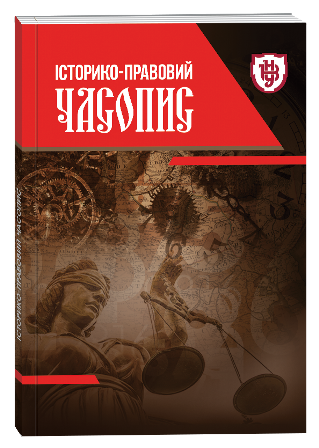GENERAL THEORETICAL CHARACTERISTICS OF HUMAN RIGHTS IN RECENT DOCTRINES
DOI:
https://doi.org/10.32782/2409-4544/2023-1/3Keywords:
human rights, needs, interests, opportunities, desire, fundamental doctrine, anti-fundamentalist coAbstract
The article analyzes the fundamental and anti-fundamentalist concepts of human rights in order to clarify their essence, role and place in the material system of the human world. The features of "human rights" are highlighted through the prism of the analysis of these concepts. Representatives of the fundamental doctrine of inalienable human rights are P. Rabinovych, K. Apel and Y. Habermak, R. Dworkin, C. Peirce, O. Goeffe, R. Ferber and A. Maslow. According to it, human rights are justified based on the paradigm of egalitarianism and justice; the basis of this doctrine is the explanation of all human rights as their moral rights. According to it, the basic needs of a person that ensure his being as a person are subject to the necessary protection. Prominent representatives of the anti-fundamentalist concept are J. Donnelly and R. Rorty. The anti-fundamentalist concept of human rights is based on the fact that the idea of human rights itself is a product of a certain historical era, a certain society, so it cannot immanently be unrelated to this phenomenon. That is, the idea of human rights as the idea of freedom, liberation, and ensuring the autonomy of a person can, under certain conditions, acquire the opposite character – colonization, the imposition of values that are not typical for certain societies. It was concluded that: – according to the fundamental doctrine of human rights are opportunities necessary to act in a certain way or to refrain from actions in society in order to satisfy one's needs, i.e. they mediate the satisfaction of the needs of their bearer according to the level of development, first of all, of the society in which these needs are formed and in which he intends to satisfy them; – the anti-fundamentalist concept denies the universal nature of human rights, justifying it by the fact that each person or community has its own view of its life and development, and that is why it may not be necessary to implement some rights. However, the emphasis is on the observance of the "culture of human rights", since it is a product of society and consists in not hindering the exercise of the rights of other people. Some features of the term "human rights" are highlighted based on the analysis of the conceptual approaches considered in the article.
References
Пацурківський П. С., Гаврилюк Р. А. Алгебра верховенства права або буттєвий устрій людського світу. Право України. 2017. № 3. С. 112–125.
Рабінович П. М. Основи загальної теорії права та держави: Навч. посібник. Вид. 10-е, доповнене. Львів: Край, 2008. 224 с.
Апель К.-О. Проблема філософського обґрунтування у світлі трансцендентальної прагматики мови; [пер. з нім. В. М. Купліна]; [упоряд. К. Байнес та ін. ; пер. за заг. ред. В. В. Ляха]. К. : Четверта хвиля, 2000. С. 214–256.
Апель К.-О. Киевские лекции: науково-популярна література. К.: Стилос, 2001. 52 с.
Апель К.-О. Дискурс і відповідальність: проблема переходу до постконвенціональної моралі ; [пер. з нім. В. М. Купліна]. К. : Дух і Літера, 2009. 430 с. 3
Apel K.-O. Transformation der Philosophie. BandI. Sprachanalytik, Semiotik, Hermeneutik. Frankfurt am Main : Suhrkamp, 1973. 384 s.
Хабермас Ю. Моральное сознание и коммуникативное действие : пер. с нем. Под ред. Д. В. Скляднева. СПб. : Наука, 2000. 379 с. 40.
Habermas J. Faktizität und Geltung. FrankfurtamMain : Suhrkamp, 1992. 667 s.
Dworkin R. Taking rights seriously. Harvard University Press, 1978. 371 p.
Пирс Ч. С. Избранные философские произведения; [пер. с англ. К. Голубович, К. Чухрукидзе, Т. Дмитриева ; ред. Л. Макеевой и др.]. М. : Логос, 2000.
Кауфман А. Попередні зауваження щодо правової логіки та онтології відносин. Засади правової теорії, заснованої на понятті персони. Філософія права і загальна теорія права. 2013. № 1.
Мельвиль Ю. К. Чарлз Пирс и прагматизм (У истоков американской буржуазной философии XX в.) . М. : Издательство МГУ, 1968
Маслоу А. Г. Мотивация и личность : [пер. з англ. А.М. Татлыбаева]. СПб : Евразия, 1999. 479 с.
DONNELLY, Jack, 2007. The Relative Universality of Human Rights. Human Rights Quarterly. 29 (2), pp. 282–313.
RORTY, Richard, 1999. Human Rights, Rationality and Sentimentality. In: SAVIĆ, Obrad et al. The Politics of Human Rights. London: Versop. 739.







